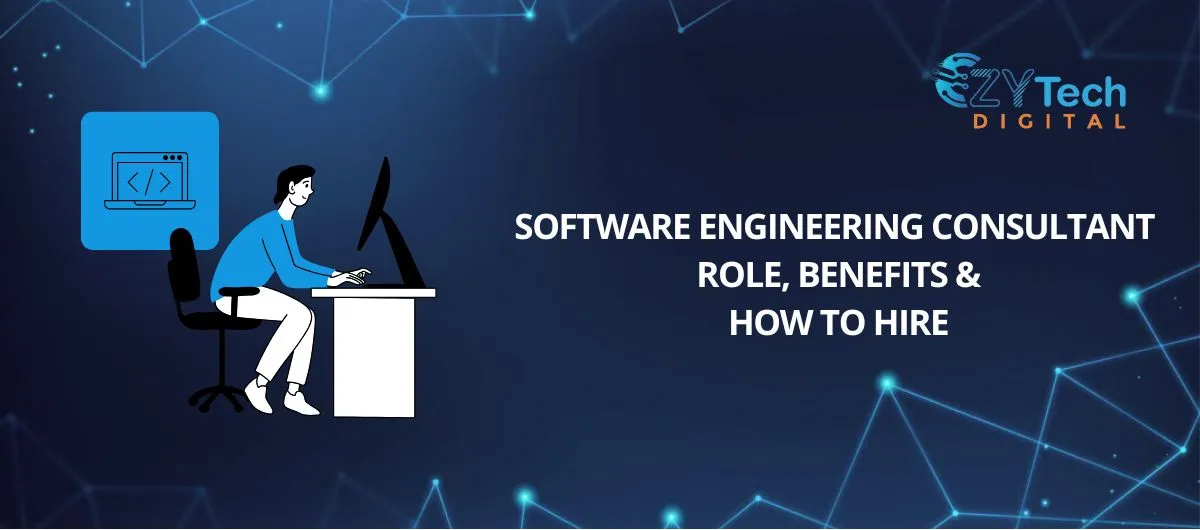
In today’s fast-paced digital world, businesses rely heavily on software solutions to streamline operations, improve customer experience, and stay competitive. As a Software Engineering Consultant, I help companies design, develop, and optimize their software systems. Whether you run a startup, a large enterprise, or an organization looking for custom software development, hiring a consultant can save time, reduce costs, and ensure high-quality results.
In this detailed guide, I will explain the role, benefits, and hiring process for a software engineering consultant so that you can make the best decision for your business.
What is a Software Engineering Consultant?
A Software Engineering Consultant is a technology expert who provides businesses with specialized knowledge in software development, system architecture, and IT strategy. Unlike in-house software developers, consultants work on a project or contract basis, offering customized solutions tailored to the unique needs of a company.
Key Responsibilities of a Software Engineering Consultant
A software engineering consultant plays an important role in guiding businesses through technical challenges. Their responsibilities include:
- Understanding Business Needs – Analyzing a company’s software requirements and identifying the best technology solutions.
- Designing Software Architecture – Creating scalable, secure, and efficient system architectures.
- Choosing the Right Technology Stack – Selecting the best programming languages, frameworks, and databases.
- Developing and Optimizing Software – Writing clean, maintainable code and improving system performance.
- Ensuring Security and Compliance – Making sure the software meets industry security standards and regulations.
- Managing Development Projects – Overseeing the software development lifecycle (SDLC) using Agile, Scrum, or other methodologies.
- Providing Training and Support – Assisting internal teams with software implementation and maintenance.
Benefits of Hiring a Software Engineering Consultant
Hiring a software engineering consultant provides numerous advantages for businesses looking to enhance their technology infrastructure. Below are the key benefits:

1. Expertise in Software Development
Consultants have extensive industry experience and knowledge of the latest software engineering trends. They bring innovative solutions that help businesses improve their products and services.
2. Cost-Effective Solution
Instead of hiring a full-time software engineering team, companies can save money by hiring a consultant for specific projects or technical guidance.
3. Faster Development and Deployment
A consultant ensures the software development process is efficient and follows best practices, leading to faster delivery of high-quality products.
4. Scalability and Flexibility
A consultant helps businesses scale their software systems while avoiding unnecessary infrastructure investments.
5. Objective and Unbiased Advice
Unlike in-house teams, consultants provide neutral recommendations on technology choices, software design, and development strategies, helping businesses avoid costly mistakes.
How to Hire the Right Software Engineering Consultants
Finding the right software engineering consultant requires careful consideration. Here’s a step-by-step process to help you choose the best fit for your project:
1. Define Your Software Needs
Before hiring a consultant, clearly define your project goals, challenges, and technical requirements. Consider whether you need expertise in web development, mobile app development, AI, cloud computing, or cybersecurity.
2. Check the Consultant’s Experience and Portfolio
- Review previous projects to assess their expertise.
- Look for experience in your industry, such as finance, healthcare, or e-commerce.
- Check case studies or testimonials from past clients.
3. Evaluate Technical Skills
- Ensure the consultant is proficient in relevant programming languages (Python, Java, JavaScript, C++, etc.).
- Check knowledge in software architecture, DevOps, UI/UX design, and database management.
4. Read Client Reviews and Testimonials
- Look for online reviews on LinkedIn, Google, or freelance platforms.
- Ask for references from past clients to verify expertise and reliability.
5. Discuss Communication and Project Management Approach
- Ask about their preferred software development methodology (Agile, Scrum, Waterfall, etc.).
- Ensure the consultant provides regular project updates and clear communication.
6. Compare Pricing and Contract Terms
- Get multiple price quotes and compare pricing models (hourly, fixed, or retainer-based).
- Make sure the contract includes deliverables, deadlines, and payment terms.
Final Thoughts
Hiring a Software Engineering Consultant is one of the best decisions a business can make to improve its software infrastructure, security, and overall efficiency. Whether you need assistance with custom software development, system optimization, or project management, a consultant brings valuable expertise and ensures your technology aligns with your business goals.
If you’re looking for an experienced software engineering consultant, start by defining your needs, reviewing portfolios, and choosing a professional with a proven track record.
Are you ready to take your software projects to the next level? Contact a software engineering consultant today and bring your vision to life!
READ MORE: Hire Dedicated Developers in India
Frequently Asked Questions (FAQs)
A software engineering consultant provides expert advice and solutions in software development, system architecture, and IT strategy. They analyze business requirements, design scalable systems, select appropriate technologies, develop software, ensure security compliance, manage projects, and offer training and support to internal teams.
Hiring a consultant offers several advantages, including access to specialized expertise, cost-effective solutions, faster development and deployment, scalability, flexibility, and unbiased, objective advice. Consultants can help optimize your software infrastructure, enhance security, and improve overall efficiency.
The cost varies based on factors such as the consultant’s experience, the complexity of the project, and the duration of the engagement. Consultants may charge hourly rates, fixed project fees, or retainer-based fees. It’s advisable to obtain quotes from multiple consultants to find a pricing model that fits your budget.
If your business faces challenges like outdated software systems, security vulnerabilities, scalability issues, or a lack of in-house expertise for a specific project, hiring a software engineering consultant can provide the necessary guidance and solutions. They can assess your current systems and recommend improvements aligned with your business goals.
The duration varies based on project complexity and scope. Some projects may require a few weeks, while others, especially large-scale system overhauls, can extend over several months. Clear timelines are usually established during the project planning phase.
